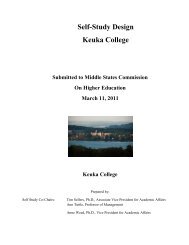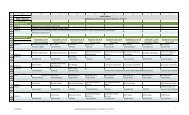final version of the self-study document - Keuka College's Middle ...
final version of the self-study document - Keuka College's Middle ...
final version of the self-study document - Keuka College's Middle ...
You also want an ePaper? Increase the reach of your titles
YUMPU automatically turns print PDFs into web optimized ePapers that Google loves.
Psychological Association, <strong>the</strong> Psychology program has focused on enhancing its<br />
research-oriented courses, in particular developing various objectives related to research<br />
capabilities, quantitative literacy, and scientific critical thinking (2009 Psychology<br />
Assessment Report Final). Assessment work since this major curriculum overhaul has<br />
led to significant changes in activities and assessment measures in <strong>the</strong> program, some <strong>of</strong><br />
which follow: new multiple-choice examination questions and <strong>the</strong> implementation <strong>of</strong> a<br />
student research journal requirement, both pertaining to scientific methodology within<br />
PSY 101 Introductory Psychology; greater attention to strategies for helping students<br />
continue to develop <strong>the</strong>ir statistical knowledge and skills in PSY 332 Experimental<br />
Methodology through course activities that provide additional practice in using <strong>the</strong> SPSS<br />
statistical analysis s<strong>of</strong>tware; and sequencing <strong>of</strong> activities in PSY 360 Junior Research<br />
Seminar to develop a research proposal for <strong>the</strong>ir senior capstone research project and <strong>the</strong><br />
development <strong>of</strong> grading checklists and rubrics to guide <strong>the</strong> development <strong>of</strong> <strong>the</strong> research<br />
proposal. As part <strong>of</strong> <strong>the</strong> most recent (2012-2013) Psychology Assessment Plan, <strong>the</strong> My<br />
Virtual Child childrearing simulation was included as a learning tool to meet program<br />
goal 4 (application <strong>of</strong> psychology) in PSY 249 after <strong>the</strong> instructor had reviewed an<br />
assessment report from field research which indicated that this simulation reinforced and<br />
enhanced <strong>the</strong> understanding <strong>of</strong> several concepts pertaining to parenting and child<br />
development among <strong>the</strong>ir developmental psychology students. Utilizing similar<br />
assessment items in Spring 2012, <strong>the</strong> PSY 249 instructor found similar results, supporting<br />
continued use <strong>of</strong> <strong>the</strong> s<strong>of</strong>tware. Whereas an instructor-written booklet had been<br />
incorporated to supplement <strong>the</strong> textbook readings about research, <strong>the</strong> instructor revised<br />
<strong>the</strong> booklet in Fall 2012 to tie more explicitly <strong>the</strong> steps in <strong>the</strong> scientific process to <strong>the</strong><br />
program outcome using a mnemonic device that a group <strong>of</strong> researchers had utilized to<br />
enhance understanding <strong>of</strong> research concepts. Additionally, <strong>the</strong> instructor’s plans for<br />
course improvement include restructuring both formative and summative assessment<br />
exercises to streng<strong>the</strong>n students’ ability to plan and conduct research. Additional analysis<br />
<strong>of</strong> student success in achieving this program outcome identified that assessment tools in<br />
o<strong>the</strong>r courses need to be revisited for <strong>the</strong>ir effectiveness in providing useful information<br />
to guide program evaluation.<br />
Program Assessment Example: Nursing<br />
The Nursing programs (B.S., M.S.) are <strong>the</strong> only ones <strong>of</strong>fered solely in an accelerated<br />
format through ASAP. The Nursing programs are accredited by <strong>the</strong> Commission on<br />
Collegiate Nursing Education (CCNE), and <strong>the</strong>ir program learning goals and assessment<br />
are structured, in part, to meet <strong>the</strong> CCNE regulations. The most recent Nursing<br />
assessment reports (Appendix 4.44 Nursing Assessment June 2012) demonstrate <strong>the</strong><br />
integration <strong>of</strong> CCNE learning goals and <strong>the</strong> alignment <strong>of</strong> E-LEAP goals. The Nursing<br />
program has an internal curriculum committee, consisting <strong>of</strong> two full-time and one parttime<br />
faculty, which regularly evaluates its courses through review <strong>of</strong> <strong>the</strong> student<br />
evaluation <strong>of</strong> instruction forms and an in-house instructor evaluation <strong>of</strong> courses form.<br />
Eight <strong>of</strong> <strong>the</strong> twenty-four courses are reviewed and updated every six months, so <strong>the</strong> entire<br />
curriculum (B.S. and M.S.) is reviewed every eighteen months to ensure currency <strong>of</strong><br />
course outcomes and materials. Each course in <strong>the</strong> baccalaureate and master’s program is<br />
assigned to a subject matter expert or “keeper <strong>of</strong> <strong>the</strong> course” (KOC) who serves as lead<br />
faculty member responsible for <strong>the</strong> necessary and appropriate updating <strong>of</strong> <strong>the</strong> course.<br />
Page 23 <strong>of</strong> 31 Chapter 4: Inst. Effectiveness & Assessment




